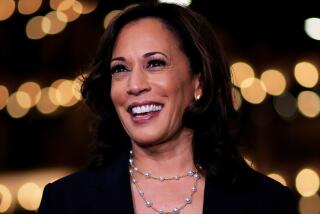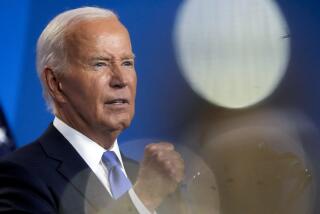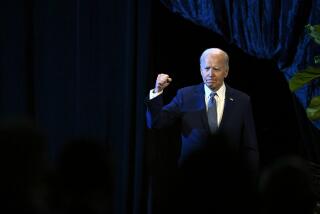Dean Is Forced to Scale Back
ALBUQUERQUE — Staggering after two early losses and a campaign spending binge that has left him little money, Democratic presidential candidate Howard Dean is embarking on the untested strategy of looking past Tuesday’s round of primaries and caucuses in hopes of stopping Sen. John F. Kerry later in the election calendar, top campaign officials confirmed Friday.
Dean will try to win the Michigan primary and Washington caucuses a week from today and, in particular, set his sights on the 72 delegates at stake on Feb. 17 in liberal Wisconsin, said Roy Neel, the new chief executive of the campaign.
“Has such a strategy ever worked before?” Neel asked in an online memo to supporters Friday night. “No. It’s never been tried.”
In a best-case scenario for Dean, the delay will give the former Vermont governor time to replenish his campaign treasury and to win later primaries, making him the principal alternative to Kerry, a U.S. senator from Massachusetts.
But the gambit risks letting Kerry tighten his hold on the lead in the Democratic presidential race if he can win most, or all, of the states to be contested on Tuesday -- Missouri, South Carolina, Oklahoma, Arizona, New Mexico, Delaware and North Dakota.
“Any time you get into this business of skipping over something, you run the risk of creating a whole new reality in the here and now while you’re focused on the firewall you’re building in some far-off primary,” said Bill Carrick, a top Democratic strategist, who advised Missouri Rep. Dick Gephardt before Gephardt dropped from the presidential race.
“If John Kerry wins all seven states” on Feb. 3, Carrick said, “then what’s the rationale for Dean’s candidacy?”
Carrick had the same lesson hammered home in recent weeks, when Gephardt attempted to ignore New Hampshire, with plans of focusing on the South Carolina primary. As it turned out, Gephardt was not around for either; his distant fourth-place finish in Iowa pushed him out of the race.
Dean has been forced into the new strategy in large part by his heavy spending in the first two contests. He raised $41 million last year, a record among Democratic presidential candidates, but spent most of it by the time the Iowa and New Hampshire contests were over.
That leaves Dean claiming just $3 million in his treasury. Campaign Chairman Steve Grossman conceded in a phone interview Friday that the spending in the first two states was “enormous, and you can emphasize ‘enormous.’ ”
“Perhaps we were not as disciplined when we had momentum and when things were going our way,” Grossman said, adding that now, “everything is on the table and the campaign has to show ironclad discipline about how it spends every dollar.”
Through Tuesday’s second-place finish in the New Hampshire primary, Dean’s camp had spent $8.4 million on television advertising, more than any other candidate. The next closest budget for TV advertising was retired Gen. Wesley K. Clark’s $6.9 million.
What’s more, nearly $3 million of Dean’s ad money went to states other than Iowa and New Hampshire, as his camp tried to fashion a national campaign. Some of that money will essentially be “left on the table” now, as Dean focuses on later contests, said a source close to the campaign.
The source, who is privy to the thinking of top Dean officials, said that millions of dollars were also spent as the campaign became bloated with top advisors and hundreds of young field operatives in Iowa and New Hampshire. With 400 paid staffers in those states, Dean far outstripped hiring by his rivals.
Just two weeks ago, the Dean campaign said it would spend $20,000 a month for the travel expenses of former ambassador and presidential candidate Carol Moseley Braun as she speaks on Dean’s behalf.
An unknown amount also went to buy orange “Perfect Storm” knit caps for hundreds of Dean volunteers in Iowa and to distribute 75,000 videotapes in New Hampshire -- copies of an interview that Dean and his wife Judy gave to ABC’s Diane Sawyer.
Several top donors became so concerned about spending that they demanded a tightening of the purse strings in a meeting In Concord, N.H., two days before the primary there, said the campaign source.
A day after the primary, Dean retreated to Burlington, Vt., and announced the appointment of Neel as his new campaign CEO. Campaign Manager Joe Trippi resigned the same day.
Dean aide Kate O’Connor said the campaign expected all along to be low on funds by early February, although she acknowledged the rate of spending may have been too rapid.
“All of a sudden we were propelled into frontrunner status, on the cover of magazines,” she said. “You don’t know how to do it.”
Neel, too, acknowledged being “surprised” when he took over the campaign that so much had been spent so quickly.
“We had a campaign operation in place in a lot of different places,” he said in an interview. “You can second-guess any of that. I’m not doing that because I’m not about to come up here and second-guess why we rented this car and took this trip.... You make strategic choices. Some of them work; some of them don’t.”
He denied that the campaign had spent too much on surrogates like Al Gore, his former boss, and Moseley Braun, saying, “I haven’t seen any gold-plating of any piece of this.”
Campaign chairman Grossman said Dean’s setbacks have done little to slow contributions to the campaign, which he said continue to roll in at the rate of about $250,000 a day.
The Dean camp said that while the press has made much of Tuesday’s primaries, only 269 of the 2,161 delegates needed for the Democratic nomination will be at stake. By winning down the road, and particularly in Wisconsin, Dean could position himself as the clear alternative to Kerry, Neel said in his online memo.
“It is a stand-alone primary where we believe we can run very strong,” Neel said of Wisconsin. “Second, it kicks off a two-week campaign for over 1,100 delegates on March 2, and the shift of the campaign that month to nearly every big state.” Neel then listed some of the Super Tuesday states of March 2 -- California, New York and Ohio -- and a series of contests that follow.
The campaign said Dean was not writing off the Feb. 3 primary and caucus states and that he would have Gore and other surrogates make appearances there to bolster his own.
“We’re behind and we have a lot to get done and marshal our resources,” Neel concluded.
*
Times staff writer Mark Z. Barabak contributed to this report. Rainey reported from Los Angeles and Gold from Albuquerque.
More to Read
Get the L.A. Times Politics newsletter
Deeply reported insights into legislation, politics and policy from Sacramento, Washington and beyond. In your inbox three times per week.
You may occasionally receive promotional content from the Los Angeles Times.











